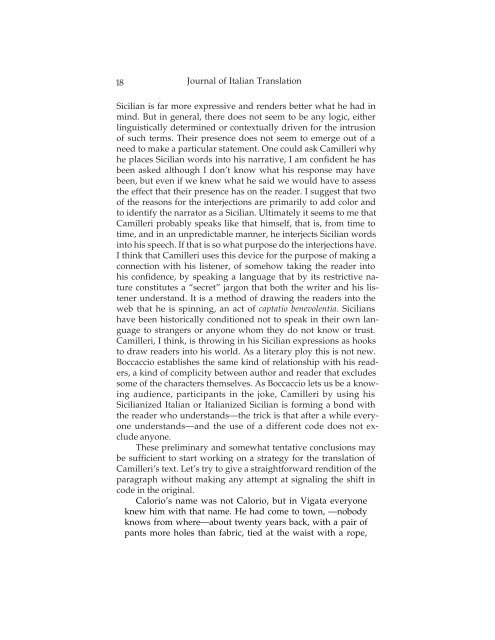Journal of Italian Translation
Journal of Italian Translation
Journal of Italian Translation
Create successful ePaper yourself
Turn your PDF publications into a flip-book with our unique Google optimized e-Paper software.
18<br />
<strong>Journal</strong> <strong>of</strong> <strong>Italian</strong> <strong>Translation</strong><br />
Sicilian is far more expressive and renders better what he had in<br />
mind. But in general, there does not seem to be any logic, either<br />
linguistically determined or contextually driven for the intrusion<br />
<strong>of</strong> such terms. Their presence does not seem to emerge out <strong>of</strong> a<br />
need to make a particular statement. One could ask Camilleri why<br />
he places Sicilian words into his narrative, I am confident he has<br />
been asked although I don’t know what his response may have<br />
been, but even if we knew what he said we would have to assess<br />
the effect that their presence has on the reader. I suggest that two<br />
<strong>of</strong> the reasons for the interjections are primarily to add color and<br />
to identify the narrator as a Sicilian. Ultimately it seems to me that<br />
Camilleri probably speaks like that himself, that is, from time to<br />
time, and in an unpredictable manner, he interjects Sicilian words<br />
into his speech. If that is so what purpose do the interjections have.<br />
I think that Camilleri uses this device for the purpose <strong>of</strong> making a<br />
connection with his listener, <strong>of</strong> somehow taking the reader into<br />
his confidence, by speaking a language that by its restrictive nature<br />
constitutes a “secret” jargon that both the writer and his listener<br />
understand. It is a method <strong>of</strong> drawing the readers into the<br />
web that he is spinning, an act <strong>of</strong> captatio benevolentia. Sicilians<br />
have been historically conditioned not to speak in their own language<br />
to strangers or anyone whom they do not know or trust.<br />
Camilleri, I think, is throwing in his Sicilian expressions as hooks<br />
to draw readers into his world. As a literary ploy this is not new.<br />
Boccaccio establishes the same kind <strong>of</strong> relationship with his readers,<br />
a kind <strong>of</strong> complicity between author and reader that excludes<br />
some <strong>of</strong> the characters themselves. As Boccaccio lets us be a knowing<br />
audience, participants in the joke, Camilleri by using his<br />
Sicilianized <strong>Italian</strong> or <strong>Italian</strong>ized Sicilian is forming a bond with<br />
the reader who understands—the trick is that after a while everyone<br />
understands—and the use <strong>of</strong> a different code does not exclude<br />
anyone.<br />
These preliminary and somewhat tentative conclusions may<br />
be sufficient to start working on a strategy for the translation <strong>of</strong><br />
Camilleri’s text. Let’s try to give a straightforward rendition <strong>of</strong> the<br />
paragraph without making any attempt at signaling the shift in<br />
code in the original.<br />
Calorio’s name was not Calorio, but in Vigata everyone<br />
knew him with that name. He had come to town, —nobody<br />
knows from where—about twenty years back, with a pair <strong>of</strong><br />
pants more holes than fabric, tied at the waist with a rope,

















